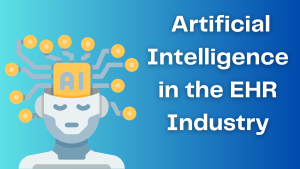Key Points:
- AI-powered EHRs provide clinicians with real-time decision support
- NLP in EHRs can extract valuable information from unstructured clinical narratives
- AI-driven EHRs can predict patient outcomes
- AI can analyze medical images like X-rays, MRIs, and CT scans
- AI can streamline EHR workflows
AI is Transforming the EHR Industry
Note: ChatGPT was used to assist in the development of this article.
 Advancements in EHRs leveraging Artificial Intelligence have been transformative in healthcare. Here are some key advancements:
Advancements in EHRs leveraging Artificial Intelligence have been transformative in healthcare. Here are some key advancements:
Clinical Decision Support
AI-powered EHRs provide clinicians with real-time decision support. They analyze patient data, historical records, and the latest medical literature to suggest treatment options, flag potential drug interactions, and offer diagnostic insights. This reduces errors and improves patient care.
Natural Language Processing (NLP)
NLP in EHRs can extract valuable information from unstructured clinical narratives, such as doctor’s notes and patient histories. This enables better coding, accuracy in medical billing and comprehensive data analysis. This all enhances both clinical and financial outcomes.
Predictive Analytics
AI-driven EHRs can predict patient outcomes and disease progression based on historical data. This assists healthcare providers in proactive patient management, early intervention, and resource allocation. This ultimately leads to improved patient outcomes.
Voice Recognition and Dictation
AI-powered voice recognition tools allow clinicians to dictate notes and patient information directly into the EHR. This not only saves time but also reduces the risk of transcription errors.
Image Recognition
AI can analyze medical images like X-rays, MRIs, and CT scans. It can assist in detecting abnormalities, tumors, or other conditions, thereby improving diagnostic accuracy and speed.
Clinical Documentation Improvement (CDI)
AI-driven CDI tools help physicians and coders ensure more accurate and complete clinical documentation. This results in better coding, accuracy in medical billing and more appropriate reimbursement.
Population Health Management
AI can analyze EHR data to identify at-risk populations, recommend preventive measures, and improve care management for chronic diseases. This contributes to better population health outcomes and cost savings.
Security and Privacy
AI-enhanced EHRs can help identify and mitigate security breaches or unauthorized access to patient data. Machine learning algorithms can detect unusual patterns of data access, flagging potential security threats.
Workflow Optimization
AI can streamline EHR workflows, reducing administrative burdens on healthcare providers. For example, AI-driven virtual assistants can schedule appointments, send reminders, and handle routine administrative tasks.
What EHRs are using AI effectively?
While most EHRs are exploring the use of AI, there are a few that stand out from the crowd and are implementing AI effectively to enhance their functionality.
Epic
Using OpenAI’s GPT-4, Epic has integrated it with their software It features natural language queries. Also, Epic has integrated with Suki, a AI Voice Assistant Company to assist clinicians to generate clinical notes.
athenahealth
athenahealth partnered with Nuance to leverage AI for their clients. Nuance helps with speech recognition that can improve clinical documentation.
eClinicalWorks
One of the first EHRs to use machine learning to develop a AI virtual assistant they call EVA.
eClinicalWorks invested $100 million in Azure Cloud Services. They have implemented ChatGPT and machine learning models into eClinicalWorks EHR as well as their Practice Management solutions.
eClinicalWorks has started to implement ChatGPT and machine learning models into their EHR and Practice Management software solutions.
Allscripts
Leveraging OpenAI’s GPT-4, Allscripts which is now owned by Veradigm is enhancing their EHR system. They are focused on providing personalized treatment plans and better patient care capabilities.
Cerner
Another EHR to partner with Nuance, Cerner has integrated its natural language processing technologies with voice recognition.
Benefits of Using AI to Cut Costs
As per research from Harvard’s School of Public Health, while it’s still in its nascent stages, the application of AI in making medical diagnoses has the potential to cut treatment expenses by as much as 50% and enhance health outcomes by 40%.
Summary
Overall, the integration of AI into EHRs holds great promise for improving patient care, reducing administrative burdens, enhancing data accuracy, and advancing healthcare outcomes. As AI technologies continue to evolve, EHRs are likely to become even more intelligent and indispensable tools in the healthcare industry.
How is AI Being Used in EHR Systems?
AI is being integrated into Electronic Health Record (EHR) systems to enhance their functionality and improve patient care. Key uses of AI in EHR systems include:
- Predictive Analytics: AI algorithms analyze historical patient data to predict future health events, such as the likelihood of hospital readmissions, disease outbreaks, or the progression of chronic diseases.
- Clinical Decision Support: AI provides real-time support to clinicians by offering evidence-based recommendations, flagging potential medication errors, and suggesting differential diagnoses based on patient data.
- Natural Language Processing (NLP): AI-powered NLP tools can process and interpret unstructured data within EHRs, such as physician notes, to extract meaningful insights and improve documentation accuracy.
- Personalized Treatment Plans: AI helps in creating personalized treatment plans by analyzing patient-specific data and comparing it with vast datasets to find the most effective treatment protocols.
- Operational Efficiency: AI streamlines administrative tasks such as billing, coding, and scheduling, reducing the administrative burden on healthcare providers and improving overall efficiency.
How Will AI Change the Healthcare Industry?
AI is poised to revolutionize the healthcare industry in several transformative ways:
- Improved Diagnostics: AI algorithms can analyze medical images, pathology slides, and other diagnostic tests with high accuracy, leading to earlier and more accurate diagnoses.
- Enhanced Patient Care: AI enables personalized medicine by analyzing individual patient data to tailor treatments, improving outcomes and patient satisfaction.
- Operational Efficiency: AI can optimize hospital operations, reduce wait times, and streamline workflows, leading to cost savings and better resource utilization.
- Drug Discovery and Development: AI accelerates the drug discovery process by predicting which drug formulations will be most effective, reducing the time and cost involved in bringing new drugs to market.
- Remote Monitoring and Telemedicine: AI-powered remote monitoring tools allow for continuous patient monitoring and early intervention, particularly for chronic disease management and post-operative care.
- Data-Driven Insights: AI analyzes vast amounts of healthcare data to uncover patterns and insights that can inform public health decisions, policy-making, and personalized care strategies.
How is Epic Using AI to Change The Way EHRs Work?
Epic Systems, a leading EHR provider, is leveraging AI to enhance the functionality and efficiency of its EHR systems in several ways:
- Predictive Analytics: Epic integrates predictive analytics to help clinicians identify at-risk patients and intervene early. For example, their AI models can predict which patients are at risk for conditions like sepsis or cardiovascular events.
- Voice Recognition and NLP: Epic employs AI-powered voice recognition and NLP tools to streamline documentation, allowing clinicians to dictate notes and have them automatically transcribed and structured within the EHR.
- Care Pathways and Clinical Decision Support: Epic’s AI-driven clinical decision support tools provide real-time recommendations based on patient data, improving adherence to care pathways and enhancing clinical outcomes.
- Operational Improvements: Epic uses AI to optimize hospital operations, such as predicting patient admission and discharge patterns, which helps in better resource allocation and bed management.
- Patient Engagement: Epic incorporates AI to enhance patient engagement tools, such as chatbots and virtual assistants, which help patients manage their health, schedule appointments, and access information more easily.
How Will Generative AI Change the Jobs of Doctors and Healthcare Professionals?
Generative AI has the potential to significantly impact the roles of doctors and healthcare professionals by:
- Automating Routine Tasks: Generative AI can automate routine administrative tasks, such as generating clinical documentation, creating discharge summaries, and filling out forms, freeing up more time for patient care.
- Enhanced Decision-Making: Generative AI can provide clinicians with advanced diagnostic tools and treatment recommendations, improving decision-making and enabling more accurate and personalized care.
- Training and Education: AI can simulate complex medical scenarios and provide virtual training for healthcare professionals, enhancing their skills and knowledge without the need for traditional hands-on training.
- Patient Interaction: Generative AI can assist in patient communication by generating patient education materials, answering common questions, and providing follow-up care instructions.
- Research and Development: Generative AI can analyze vast amounts of research data to identify new treatment protocols, generate hypotheses, and accelerate clinical research.
- Collaboration and Multidisciplinary Care: AI tools can facilitate collaboration among healthcare professionals by generating comprehensive patient reports that integrate data from various specialties, ensuring a holistic approach to patient care.
While AI will transform many aspects of healthcare, it will also require healthcare professionals to adapt to new technologies and workflows, emphasizing the importance of continuous education and training in AI applications.




